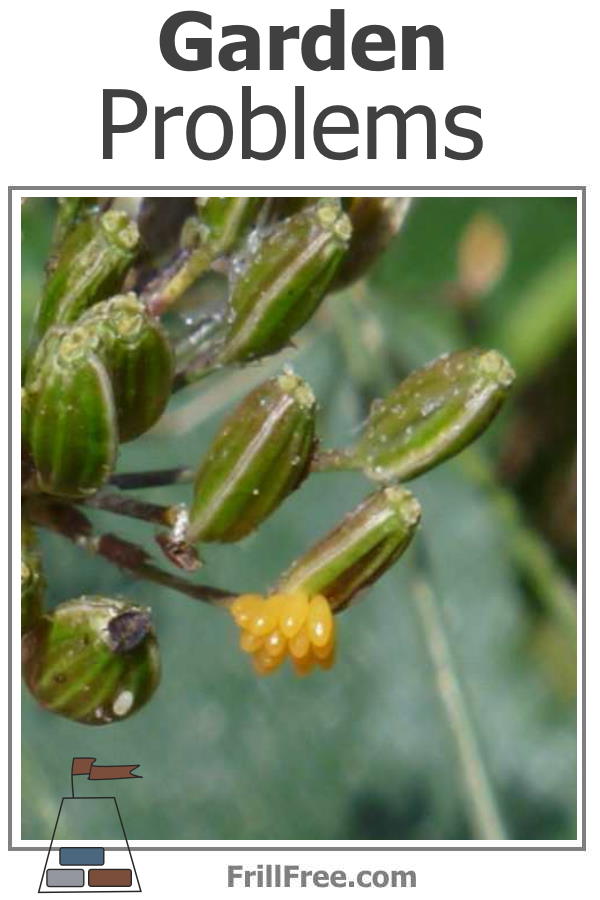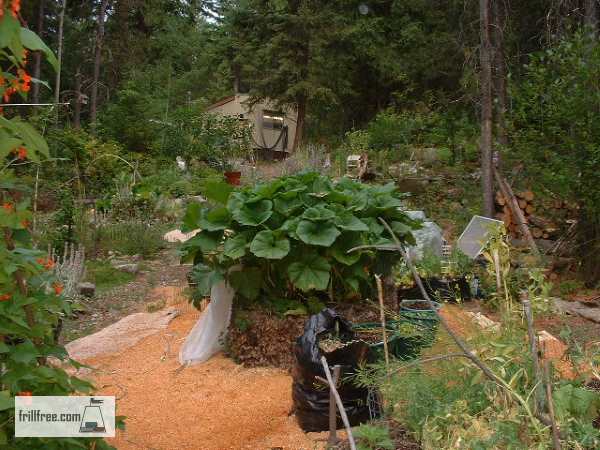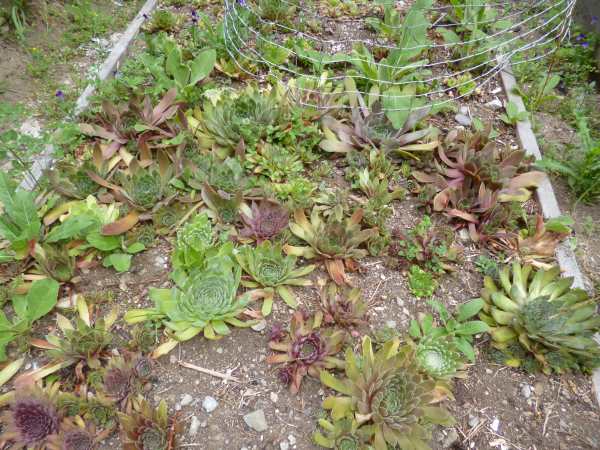- Homesteading
- Gardening for Beginners
- Garden Problems
Garden Problems
Minor Annoyance? Or Big Deal?
My poor garden - I had some major hurdles to overcome in the past few seasons; the weather cooperated for the most part, especially earlier in the summer - so much so that I was over run with weeds, which loved the nice warm rain and then the heat just as much as the vegetables.
Gardens can face a range of problems that may affect plant health, yield, and aesthetics. Here are some common garden issues along with solutions to manage or resolve them:
1. Pest Infestations
Problem: Insects such as aphids, beetles, and caterpillars damage plants by feeding on leaves and stems.
Solution: Use insecticidal soap, neem oil, or biological controls like ladybugs. Regularly inspect plants and remove pests manually if possible.
2. Disease Outbreaks
Problem: Fungal diseases like powdery mildew or bacterial infections like blight.
Solution: Improve air circulation by spacing plants properly. Avoid overhead watering to keep leaves dry. Use fungicides or bactericides when necessary.
3. Weed Overgrowth
Problem: Weeds compete with garden plants for nutrients, light, and space.
Solution: Mulch your garden to suppress weeds and retain soil moisture. Remove weeds regularly before they go to seed.
4. Soil Problems
Problem: Poor soil quality, lack of nutrients, or incorrect pH levels can hinder plant growth.
Solution: Test soil and amend it with compost, fertilizers, or lime/sulfur to adjust pH. Rotate crops annually to help maintain soil health.
5. Water Issues
Problem: Overwatering or underwatering can lead to poor plant health or death.
Solution: Ensure proper drainage and water plants according to their specific needs. Consider installing a drip irrigation system for efficiency.
If your well water is cold and inhibiting growth, put it in buckets to reach a tepid temperature before using. For large scale tempering, 45 gallon drums can hold enough water for most uses.
6. Animal Intrusion
Problem: Animals like deer, rabbits, or birds eating plants.
Solution: Install fencing, use netting, or apply repellents. Scare tactics like reflective tapes or ultrasonic devices can also deter animals.
7. Poor Pollination
Problem: Insufficient pollinator activity can lead to low fruit set or misshapen fruits.
Solution: Encourage pollinators by planting a variety of flowering plants. Avoid using pesticides that harm bees and other beneficial insects.
8. Nutrient Deficiencies
Problem: Yellowing leaves, stunted growth, or poor flowering and fruiting can indicate nutrient deficiencies.
Solution: Apply balanced fertilizers based on soil test results. Use foliar feeds to quickly address specific nutrient shortages.
By addressing these issues proactively and consistently monitoring garden conditions, you can maintain a healthy and productive garden.
My solution for the weeds is pretty simple - smother them with old carpet or layers of newspaper or cardboard.
Pathways are easy - they can be covered with a bit of sawdust or wood chips to hold the cardboard in place, and also to make it look prettier.
It's best to get this done before the weeds get too tall - if they're already blooming, that's okay, just bend them over and stomp them down.
Lay down anything that will cut off the light - that will kill
off the top growth, and over time - in some cases, two seasons - this
will stop the growth of the weeds.
As an added bonus, the sawdust holds some of the moisture in the soil; try it; wherever you have even a thin layer of wood chips or sawdust, you'll have damp soil.
My other big issue in the vegetable garden is a bit more dire; as the soil is beautiful sandy and well drained, it's not just easy for me to dig - the pocket gophers like it too.
These pesky little critters will dig extensive tunnels and are extremely hard to eradicate, barring a very determined terrier dog.
My solution to their digging is to make raised beds with chicken wire stapled to the bottom of it.
They can dig to their hearts content, leaving enough room for the roots of the plants to survive. In the large beds of Sempervivum hens and chicks that I grow, even with just shallow soil, they are quite happy.
Generally, the little rodents don't eat the top growth, just the roots.
If they do cause damage to the top growth of the plants, do what I do and make a box to cover them with, and lots of chicken wire - these are about the size of a small squirrel, so make sure the holes won't let them get in.
Look carefully at the sides of the bed - the pocket gophers push out
the soil from underneath the frame with the chicken wire on it, but the
plants are fine. This is only four inches deep, the same depth as the
lumber.
Garden bugs can be an issue, sometimes overpopulating a certain plant; don't be too hasty to grab the pesticide though. In most cases, in a while, you'll spot some lady bug larvae, which look like a tiny alligator - and they're almost as ferocious.
If you see an egg cluster like the one on the seed head of the dill below, rest assured that aphids on the plant are doomed. The ladybugs will take care of the problem for you.
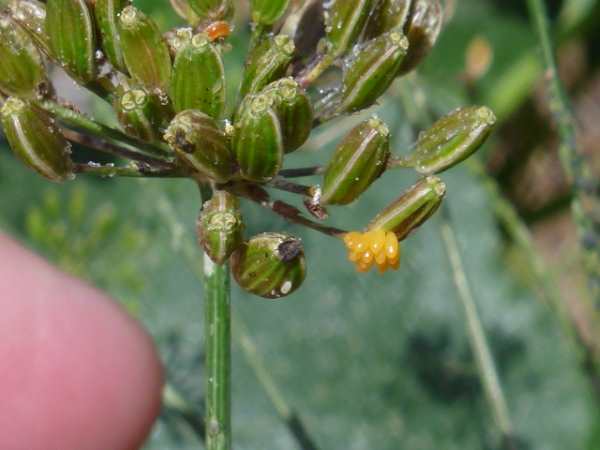 Lady Bug Eggs
Lady Bug EggsOther predators to look for are Green Lacewings, dragonflies and syrphid flies, which are always on the hunt for aphids and other pests.
Bugs always lay lots of eggs - like butterflies.
Only a handful of the caterpillars survive to be adults though.
In the case of these Mourning Cloak caterpillars, the willows were decimated by about a hundred of them; but disease and predators took their toll; only a very few live to breed.
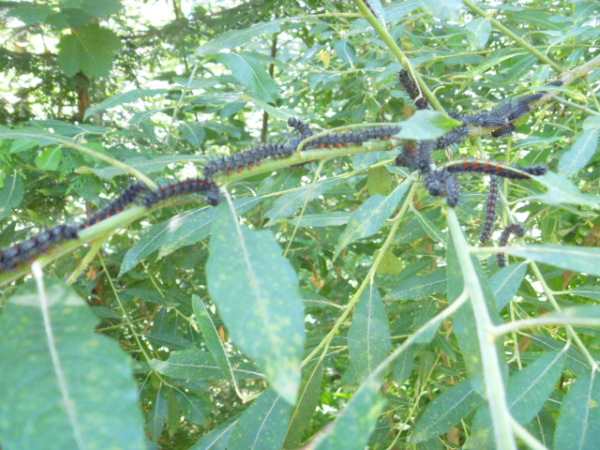
If your troubles are restricted to one plant only, more research might be needed.
I had so many problems with my tomato plants, two years in a row, and was puzzled because it didn't seem to matter the source of the plants, they still succumbed to the strange twisting of the leaves and eventual death.
I finally found the cause; aminopyralid herbicide contamination of the steer manure I added to their soil. Who woulda thunk it?
There is always something; depending on the weather, and the particular season, you'll always need to think outside the box.
Be flexible and intuitive in your solutions to issues in your garden; it might not be best to run for the backpack sprayer loaded up with deadly chemicals, or poison gas for any pests.
See how I dealt with the Hay Bale Garden and its problems.
